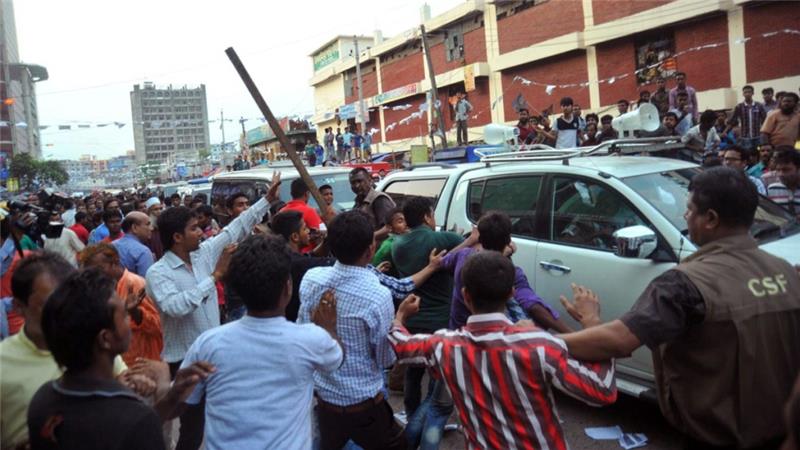by Tarique Rahman
As a democrat and a Bangladeshi, I fear for the future of democracy in my country.

The political crisis in Bangladesh is spiralling out of control. The leader of the opposition and former prime minister, my mother Khaleda Zia, has been attacked by armed thugs aligned with the government on three separate occasions this week alone.
On Monday she was shot at during an election rally, on Tuesday and again Wednesday her car was attacked in traffic by club wielding assailants. Windows were smashed and her colleagues were injured.
This is not just the normal cut and thrust of Bangladesh’s admittedly rough politics – the country seems to be heading towards a de facto one-party state. Both Khaleda Zia and myself are already facing trumped up charges pushed by a government that seems determined to wipe out all opposition to its rule.
Since Sheikh Hasina, the current prime minister, is accused of staging a deeply flawed election last year, we have reached a point where the leader of the principal opposition party is facing a show trial, and all other opposition leaders are in prison or have been executed.
 |
This situation cannot continue without threatening the very survival of democracy in Bangladesh.
Complex and uneasy
Politics in Bangladesh has often been complex and uneasy. In the first 20 years of our independence we suffered over 15 military coup attempts. But since the restoration of democracy in 1991 – apart from a brief two-year interlude – we have seen successive governments led by Zia’s BNP and Hasina’s Awami League leave office through the ballot box.
However, since the Awami League returned to office in 2008, this relative stability has been squandered and politics in the world’s second most populous Muslim country has once again been dangerously polarised.
The Awami League is playing to exploit western fears and position itself as a bulwark against extremism, providing a perception of an island of stability in a rapidly destabilising region. However, Sheikh Hasina has been no champion of secular democracy – in fact it is her increasingly opportunistic and paranoid efforts to stay in power that are now driving the country to the edge.
She has sought to drape herself in the Bangladeshi flag, defining loyalty to the country by allegiance to her party. However, her increasingly erratic rule has seen her seize control of the Grameen Bank, driving out its founder the Nobel Peace Prize winner, Mohammed Yunus, and amend the constitution to scrap the tradition of impartial caretaker governments to manage elections.The media too has been muzzled with live broadcasts taken off the air and journalists arrested. Last month, a former BNP Minister, Salahuddin Ahmed, was abducted. He has not been found.
Human Rights Watch have repeatedly called for investigations into the government’s now notorious Rapid Action Battalion, which has been accused of killing over 1,000 people without a single prosecution.
Without a democratic outlet in Parliament or the freedom to criticise their rulers, is it surprising that violence has spilled onto the streets?
Stronger response
The response from Bangladesh’s international partners needs to be much stronger. This crisis cannot be ignored. As the oxygen for political debate disappears, politics is being driven underground.
The disillusioned and disenfranchised are becoming more desperate. Extremists and nascent insurgent groups feed of desperation. In a country of 160 million Muslims, the region can ill afford another country acting as a hotbed for extremist ideologies.
And with over half a million Bangladeshis now living in the UK, a crisis on the streets of Dhaka or a village in Sylhet can all too easily become a flashpoint in London or Birmingham.
The attacks on Khaleda Zia are a new low, and a frightening throwback for a country that we hoped had shed its violent past. It is hard to believe that three armed assaults in one week are a coincidence. Clearly they mark a dangerous escalation of the current crisis.
Time is running out and Bangladesh must move back from the brink. What we need now is for our friends in the West to insist on a dialogue that can return the country to a truly, legitimate democratic government and bring fresh elections that have the confidence of the whole country.
It is the least our people deserve. If that doesn’t happen then as a son, democrat and a Bangladeshi, I fear for the future of democracy in my country.
Tarique Rahman is senior vice-chairman of the Bangladesh Nationalist Party, Banlgadesh’s principal opposition party.
The views expressed in this article are the author’s own and do not necessarily reflect Al Jazeera’s editorial policy.
Source: Al Jazeera









